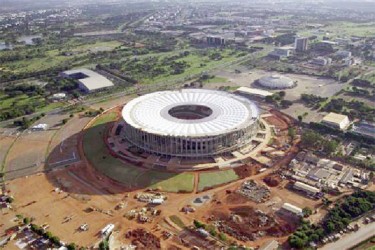SAO PAULO, (Reuters) – The most expensive of the 12 stadiums built or revamped for the 2014 World Cup has a leaking roof less than eight months after it was finished, the stadium’s operators said yesterday.

Secopa, the local government agency that runs the Mane Garrincha National Stadium in Brasilia, will ask the company that rebuilt it to explain why parts of the roof let in rain during last weekend’s women’s match between Brazil and Chile.
Local media reported that almost the entire lower ring of the stands was soaked although Secopa played down the problem, saying the leaks were not serious and would not affect any of the matches being played there during next year’s World Cup.
“Because it is a new, grandiose and complex stadium, some small points are still being corrected and tested but there is nothing that compromises the running of the stadium or the holding of events there,” Secopa said in a statement.
The stadium comes with a five-year guarantee and any repair work will be paid for by the builders, Secopa added.
The national stadium in the capital Brasilia cost more than 1.2 billion real ($508.99 million). It will stage six World Cup matches including a quarter-final and the third-place playoff.
The venue was inaugurated in May and hosted the opening match of the Confederations Cup between Brazil and Japan in June. It has held 17 major events since then, including several first division football matches, stadium officials said.
The uproar over the scandal of a leaky roof at the 73,000 seat arena is not the first time construction work at Brazilian stadiums has been called into question.
The Joao Havelange stadium in Rio was closed earlier this year, six years after it was built for the Pan American Games.
Engineers ruled that the roof was in danger of collapsing in high winds and said repairs taking 18 months must be carried out for the the stadium to be fit to host the 2016 Olympics.
At least three of the six World Cup stadiums still to be finished before the tournament kicks off in June will be handed over behind schedule. A total of five people have died while working on the 12 venues, including one man in Brasilia.








